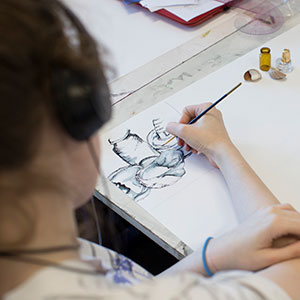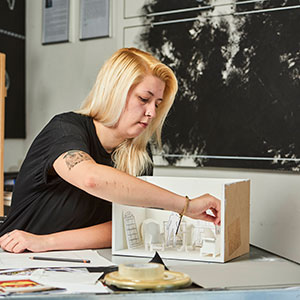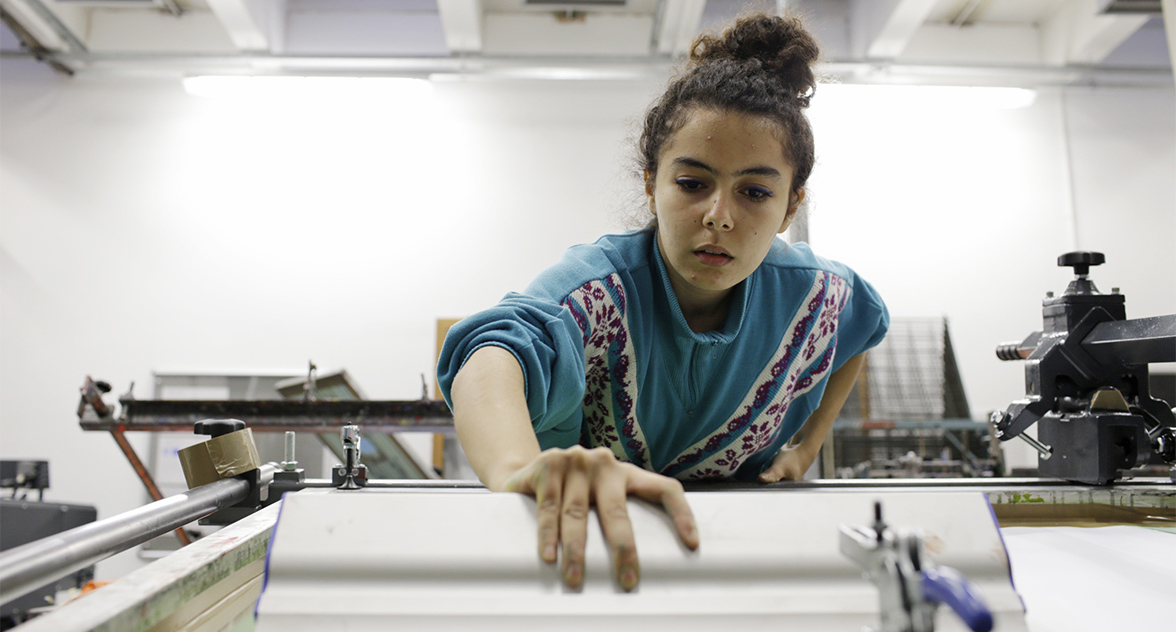
The creative industries sector
The foundations of the University of Wolverhampton are built upon creative subjects – and from an original portfolio of creative arts, we now offer a wide range of subjects that can lead you into roles in the exciting and growing creative industries sector. Whether you’re interested in gaming and esports, fashion and photography, film and tv, architecture or publishing, our courses can help your career goals.
Careers in the creative industries can include a wide variety of businesses and organisations; from libraries, museums and art galleries; theatre, music, TV and film production; to software, IT and gaming.
Did you know? The creative sector now contributes over £111 billion to the UK economy. It’s one of the fastest growing within the UK – just think of the popularity of Minecraft and Fortnite; films like Frozen and all its spin-off events; the rise of platforms like Netflix and Disney Plus.
Graduates of our creative courses enter a wide variety of roles, regionally, nationally and internationally. Find out some of their stories below. An appealing aspect of working in the creative industries is the opportunities for working abroad, or with a wide range of international partners.
Our links with industry
Placements and work experience are an integral part of many of our courses to help you hit the ground running in your career in the creative industries.
Our annual degree shows provide experience in exhibiting your work, as well as a platform to showcase it to potential investors, sponsors and employers.
Careers in the Creative Industry
You can explore and research roles available in the creative careers on the creative careers website, from account manager to VFX editor, you can explore the wide variety of roles, as well get further information from the organisations supporting those careers. This list is not extensive.
Game artists use software packages to create the visual elements of a game in either 3D or 2D for one or more platforms, such as mobile, PC, arcade or console.
As a graphic designer, you'll create eye-catching visuals for a variety of products and activities, such as:
- websites
- advertising
- books and magazines
After agreeing a brief with the client, creative director or account manager you'll develop appropriate creative ideas and concepts that meet the client's objectives.
The work demands creative flair, up-to-date knowledge of industry software and a professional approach to time, costs and deadlines.
Journalists research and write news articles and features for a wide variety of publications, increasingly online as well as for traditional printed magazines.
If you love taking photos and have an eye for a picture, you can put your photography skills to use in a variety of areas from advertising to social events.
One of the fastest growing sectors within the UK, this growth is forecast to increase
with £150 million of funding from the Creative Industries Sector Vision (CISV), which is prioritising support for the growth of micro-businesses.
In February 2022, the government announced details of £50 million of investment for creative businesses across the UK from the CISV, including £21 million on three-year UK Global Screen Fund to promote UK films internationally and £8 million to help entrepreneurial start-up game developers to grow their businesses and create new games.
The creative industries sector as a whole has been growing above the UK average since 2011 and is growing faster in the West Midlands than the rest of the UK.
There are over 10,000 creative businesses active in the region. Creative industries are adding new posts at twice the rate of the rest of the economy, according to
the Department for Digital, Culture, Media & Sport’s (DCMS) Sector Economic Estimates Employment report (2018), with an over two million jobs estimated in the sector, three-quarters outside London.
The sector contributes over £4 billion to the regional economy and this is forecast to increase through a sector deal between government and the creative industries sector to unlock growth for creative businesses into future:
- places (funding leading creative clusters to compete globally)
- technologies and content (via research into augmented reality and virtual reality)
- creative skills (via a careers programme that will open up creative jobs to people of every background).
There is wide-ranging support at governmental level for the development of the sector, for example from the West Midlands Combined Authority.
Schemes such as the West Midlands Creative Scale Up programme, are supporting screen, gaming, VR, AI, performing arts, marketing and events, PR and design businesses with ambitions to grow and ‘scale up’ through the £1.3 million two-year programme from the DCMS.
/prod01/wlvacuk/courses/media/departments/marketing-and-communications/creative-career-banner.jpg)
Graduate Success
We have a lot of success stories from graduates forging careers in the creative industries, as well as those whose careers took them in unexpected directions.
- Special effects artist, (The Dark Knight trilogy and Academy Award-winner for best visual effects for Inception), Peter Bebb
- Best-selling writer and author of The Girl With the Louding Voice, Abi Daré, read our interview with her in edition 16 of Life Magazine.
- Digital services officer for West Midlands Police, Dan Eccleston
- CGI artist and creative director of Far Land FX and animation studio, based in Istanbul, Huseyin Kavas
- Illustrator, animator and designer, West Midlands-based Ravnita Rayet
- Stone’s Throw Media founders and entrepreneurs, Matt Weston and Mike Chinn
- Animation director on Moominvalley and Angry Birds, Avgousta Zourelidi
- Annie Benton- Photographer for Aston Villa
- Manolo Mantero Grammy award winner for special effects for Stranger Things
Our expertise and facilities
When it comes to expertise in the creative arts, the University of Wolverhampton’s foundation are built on it, with the founding of our School of Art in 1851.
Our students join a creative community of academics, industry professionals, expert technicians and internationally recognised researchers – all contributing to an inspirational and collaborative learning environment.
We celebrated the opening of our brand-new Screen School in March 2022. New industry-standard facilities include a green-screen, three-camera TV studio and radio studio which reflects the layout of BBC local stations, complemented by edit suites, staff offices and new Mac labs to support your career ambitions.
The iconic George Wallis building contains nine floors of workshops, specialist equipment and dedicated studio spaces, including some of the best equipped ceramics and glass facilities in the UK and Europe. It is here our students are provided the tuition and resources that aid their advancement as artists.
It’s also home to expert teaching staff, who provide both inspiration and practical support as aspiring practitioners explore the beauty of form and materials, solving practical challenges in subjects rooted in a contemporary curriculum.
Within this creative community, students further benefit from live briefs, exhibitions and placement opportunities – an integral part of the student journey to becoming independent, successful graduates.
Creative Courses
/prod01/wlvacuk/courses/media/departments/faculty-of-arts/images/banners/cew_video_banner_image_1.jpg)
FAQ's
Your FAQs about pursuing a career in The Creative Industry.
Most jobs in the creative sector are taken by applicants who have studied a relevant degree. While a portfolio of creative work can be helpful, becoming a graduate is a more structured way to make yourself a desirable applicant – and a postgraduate qualification can increase your knowledge and understanding to even higher levels.
As previously mentioned, it isn’t entirely necessary to have a qualification to enter a creative career, but it can increase your chances of success. Courses such as the University of Wolverhampton’s BA Creative and Professional Writing and more can all equip you with the skills and experience you need for a successful and rewarding creative career.
The satisfaction of earning your money through your passions is enormous. It may seem like a riskier choice than taking a “normal” job, but the rewards can be huge and the sector is growing. There is money to be made in creativity, and in a time when automation is becoming a factor in many industries, it’s less likely to impact creative roles for the time being, due to the innovation required being difficult to replace.
Like many careers, the more experience you have the better equipped you’ll be to tackle a future role and the more desirable a candidate you will be.
Companies from all areas of the creative sector may provide work experience for people willing to volunteer their time, but you will generally need to contact them directly rather than reply to an offer as they are unlikely to post notice of volunteer positions. If you study a course with the University of Wolverhampton, you will have access to our Careers, Enterprise and the Workplace teams who may be able to help you find experience.


/prod01/wlvacuk/media/departments/digital-content-and-communications/images-18-19/iStock-163641275.jpg)
/prod01/wlvacuk/media/departments/digital-content-and-communications/images-2024/250630-SciFest-1-group-photo-resized-800x450.png)
/prod01/wlvacuk/media/departments/digital-content-and-communications/images-18-19/210818-Iza-and-Mattia-Resized.jpg)
/prod01/wlvacuk/media/departments/digital-content-and-communications/images/Maria-Serria-(teaser-image).jpg)
/prod01/wlvacuk/media/departments/digital-content-and-communications/images-2024/241014-Cyber4ME-Project-Resized.jpg)
/prod01/wlvacuk/media/departments/digital-content-and-communications/images-18-19/210705-bric_LAND_ATTIC_v2_resized.jpg)
/prod01/wlvacuk/courses/media/images/2019-re-design/video-banner/screen-school-student-in-mo-cap-suit.jpg)






